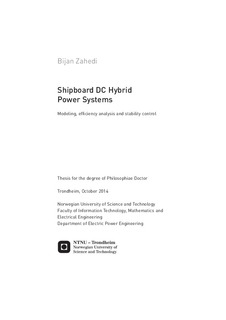| dc.contributor.advisor | Norum, Lars | nb_NO |
| dc.contributor.author | Zahedi, Bijan | nb_NO |
| dc.date.accessioned | 2014-12-19T13:56:33Z | |
| dc.date.available | 2014-12-19T13:56:33Z | |
| dc.date.created | 2014-10-29 | nb_NO |
| dc.date.issued | 2014 | nb_NO |
| dc.identifier | 759213 | nb_NO |
| dc.identifier.isbn | 978-82-326-0514-9 (printed ver.) | nb_NO |
| dc.identifier.isbn | 978-82-326-0515-6 (electronic ver.) | nb_NO |
| dc.identifier.uri | http://hdl.handle.net/11250/258034 | |
| dc.description.abstract | DC hybrid power systems are currently of interest for ship commercial marine vessels to enable low-emission and fuel-efficient operation. The benefit of using these systems is also to provide space and weight savings onboard ships. However, a shipboard dc hybrid power system requires effective analysis tools to realize the advantages.
Modeling and simulation are essential tools to facilitate design, analysis, optimization, and control of the dc hybrid power systems. The standard power system simulators need excessive computation time to simulate the above power-electronic-based power distribution systems. The limiting factor in terms of computation time is the switching behavior of the power electronic converters, which requires extremely small time steps. In order to overcome this limitation, reduced-order converter models can be used to provide time-efficient simulations. The reduced-order models are used only when studying the exact switching behavior is not necessary. In this dissertation, appropriate modeling of the converters and other elements of a shipboard dc hybrid power system is presented. The derived models are used in the development of a simulator program for system-level analysis of all-electric ships.
Fuel saving is a major motivation in the development of commercial shipboard dc power systems with onboard energy storage. Analysis of fuel consumption and efficiency modeling enable investigation of fuel saving potentials. The system efficiency is analyzed by enhancing the simulator models through including the power loss components. An on-line control strategy is proposed that optimizes the fuel consumption of the multi-generator shipboard power system. The energy storage is a key element in development of the optimization control system.
The shipboard dc power systems may consist of several power electronic converters connecting sources and loads to the grid. The stability of such power electronic-based systems is an essential issue in both design and control due to potential negative incremental resistance introduced by power electronic converters. This property is a consequence of the converter behaving as an instantaneous Constant Power Load (CPL), which can drive the system to instability. Stability analysis and control of the shipboard dc grid is another main focus in this dissertation. | nb_NO |
| dc.language | eng | nb_NO |
| dc.publisher | Norges teknisk-naturvitenskapelige universitet, Fakultet for informasjonsteknologi, matematikk og elektroteknikk, Institutt for elkraftteknikk | nb_NO |
| dc.relation.ispartofseries | Doktoravhandlinger ved NTNU, 1503-8181; 2014:301 | nb_NO |
| dc.title | Shipboard DC Hybrid Power Systems: Modeling, efficiency analysis and stability control | nb_NO |
| dc.type | Doctoral thesis | nb_NO |
| dc.contributor.department | Norges teknisk-naturvitenskapelige universitet, Fakultet for informasjonsteknologi, matematikk og elektroteknikk, Institutt for elkraftteknikk | nb_NO |
| dc.description.degree | PhD i elkraftteknikk | nb_NO |
| dc.description.degree | PhD in Electric Power Engineering | en_GB |
